- Home
- Mollie Cox Bryan
The Jean Harlow Bombshell Page 2
The Jean Harlow Bombshell Read online
Page 2
Surprising. She didn’t have many male friends.
In a hushed tone, as if he’d just remembered his manners, the man added, “I’m Sam, by the way. I’m sorry for your loss. Were you close?”
Close? I didn’t know how to answer. Some days I hated Justine Turner, other days I loved her, and some days I did both. Close? Yes, perhaps, so I nodded as tears pricked at my eyes and ran down my cheeks in a hot stream. She was my boss, I wanted to say. But she was much more to me. She taught me everything I knew about writing, researching, and pulling together a book. Hell, she even taught me more about life than anybody I could think of, even my mother. Eleven years ago, Justine had the heart to hire an intern who was struggling with Lyme disease. “We’ll work around it,” she’d said. “I like you, Charlotte Donovan.”
At the same time, she held my financial life in her hands and wasn’t beyond letting me know it on a regular basis.
My muddled brain attempted to form coherent words and sentences. Was it the Lyme? Or was it the shock? I’d been taking my meds and taking care of myself, but sometimes it wasn’t enough.
I gazed around the cluttered room. A wall hanging detailed the Heimlich maneuver. Another wall held a poster on the correct method of hand washing. A chart detailed tea varieties. Sam sat at a desk with papers scattered haphazardly on top of it.
“How long had Justine been here before I came in?” I didn’t know why it mattered to me. But it did.
He frowned. “We’ve been trying to figure that out. She ordered a pot of Darjeeling and saffron tea cakes. The pot was half drunk, and the tea cakes were gone. I assume she or her first companion ate them.”
“A man?”
“Yes, a man. They’re going over the security tapes now.”
Our meetings were always private, which is one reason Justine liked the place and her secluded booth. No press milled about to glean any leads on Justine Turner’s newest project. They simply were not allowed into the establishment.
“Justine was meeting me. She didn’t mention anybody else joining us,” I said. Did she? No, I didn’t think so. My brain still wasn’t operating at full capacity. I must be in shock. “Besides, Justine distrusted men.” She insisted all of her editors were women—her doctors, her lawyers—she didn’t want to support the “patriarchy.”
“Pardon?”
“Let’s just say she found men difficult.”
He rolled his eyes. “Don’t we all?”
I sniffed in response. Justine was dead. Dead. Right in the middle of writing a book. How would the book get finished? I stared at the pear-shaped water stain on the ceiling as if it held answers.
“How long have I been out?” I asked.
“About fifteen minutes. Thank God the paramedics slipped Justine out the back. All we need is the word to get around that someone died here.”
But someone did. A hot rush of humiliation, tinged with anger, moved through me. Justine didn’t mean to die here, asshat.
The sound of a turning doorknob and heels on the tile floor interrupted my contemplation.
“Good Lord, woman,” a voice I had known since childhood said. “What did you do to yourself ?”
“Kate? What—”
“Your grandmother called me,” she said. “I’m to bring you home.”
Grandma. Of course. She’d probably been fielding calls while Mom slept off her bender.
Kate was one of my few friends in the city. We’d grown up on Cloister Island together. Her parents assigned her the name “Karl” at birth, so in her newly transitioned female identity she was over-the-top feminine, finally allowed to be herself. She stood before me in a floral 1970s yellow chiffon dress, with high platform shoes and shiny cobalt blue beads draped around her neck.
“Home to Cloister?” I couldn’t imagine making the trek back now. Not the way I was feeling. A jammed subway train was hard for me to take, even when I was well. Too many people in the city had no sense of personal space. I wasn’t sure I could make it to the ferry and across the often-choppy waters. Besides, I planned to meet someone later, which Kate didn’t need to know about. She was like a sister, and I hated keeping secrets, but I didn’t need another lecture.
Yet at this moment, I longed for my bed in my family’s falling-down seaside cottage, and my bedroom view, which mercifully lacked people.
“That’s my orders from headquarters,” she said. Her jaw was set firm, but the spark in her eyes said volumes. “But I figure if we get you as far as my place in Chelsea, we’ll be lucky. You don’t look so hot.”
“Excuse me if I’m a mess, but my boss just died, sitting at a table in a crowded tea room,” I said. And maybe someone hurt her. Killed her. No, that couldn’t be true.
Kate walked over and helped me sit up. I dizzied, but held fast, not passing out and not throwing up. Success. “I’m so sorry about Justine. Did you hit your head?” Kate asked.
“I don’t think so,” I said, turning my face toward Sam.
“No,” he said. “Your head landed on the, uh, body bag.”
I groaned. Really, Justine? Not only did you die during our meeting, but I also had to pass out on top of your body? My face fell into my hands as I imagined falling into Justine’s body bag.
Dead. Justine was dead.
“You always were so graceful,” Kate said, smiling, helping me to stand. She handed me a roll of breath mints. “Just for you. I thought you might get sick.”
Thank God for Kate.
“Now where is your bag?” she asked.
Sam reached for my bags.
Kate grabbed my purse and my overnight bag, making eye contact, letting me know she was on to me. My overnight bag was stuffed with clothes, along with my hopes of meeting up with the smoking hot cop I met online.
“Thank you, Sam,” I said.
“Oh, don’t forget these,” he said and held up keys.
I reached for them and examined them. A diamond-encrusted Chanel key ring and a gold Eiffel Tower sparkled next to Justine’s keys. They must have fallen out of her bag or jacket. I dropped them into my purse.
“Take care, Charlotte,” he said and then ushered us quickly out the back door, past huge unpacked boxes of tea and sacks of flour and sugar, giving me the impression he wanted us gone as soon as possible. I didn’t blame him.
After the door closed with a loud clank from behind, Kate and I paused for a moment, getting our bearings. We stood in a narrow backstreet alley, surrounded by dumpsters overflowing with trash and misspelled graffiti on the grimy walls. Traffic noise muffled in between the building and the trash cans.
“Is that supposed to be the word motherf—” I said.
“I always knew we’d end up in an alley together,” she interrupted.
“Ha!” I replied. The sound of heels clicking on the ragged sidewalk prompted me to turn my head. A woman with a swath of platinum-blonde hair, a tight A-line skirt, and silver pumps rushed past, from one corner of the alley to the other. Her face turned our way for a nanosecond. My heart pounded against my ribs—I swore Jean Harlow herself glanced at me and dashed off.
“This Harlow book has brought all the kooks out!” Justine had said.
I grabbed Kate. “Did you see that woman?”
“Who?” she said, distracted by her necklace getting tangled with her handbag strap.
“Never mind,” I said. The woman had vanished. Kate would never believe me. Hell, I didn’t believe me. I blinked. My mind was still in a muddle. Great, now I’m seeing Jean Harlow look-alikes. Could this day get any worse?
But with Justine’s words fresh in my mind, I ran to the corner and looked down the street.
“Charlotte! What are you doing?” Kate yelled and trailed after me, trying to catch me in her platform shoes.
I realized the woman was gone. I had no idea how she’d vanished so quickly. I caught the scent of
her lilac-scented perfume or soap—welcome over the rank trash odor surrounding us. A cold tingle ran up my spine. My grandmother always said that strange feeling meant someone was walking on your grave. Whatever that was supposed to mean.
“What is your problem?” Kate said as she caught up.
I leaned against the building. How to explain?
“There was this blonde,” I said between breaths. “She looked like Jean Harlow. And Justine said the book had brought out all the Harlow kooks … and I wondered if she knows something … anything … anything she could tell me about the book … or the man at the tea house … Justine … I don’t know. It just seems too weird to be a coincidence after everything Justine said, and then she died, like, right after she said all that.” Or maybe I was grasping and delusional, clutching at clouds. Tears came flooding and a big ugly cry overcame me. Kate dropped her bags, opened her arms, and held me as I sobbed.
After several minutes, she peeled me away from her and held me by the shoulders. “Aw, hon, you need to get ahold of yourself. You’re just not making any sense. Let’s get you some food and a drink or two.” She turned and waved at a taxi, which drove by as if she didn’t exist.
While we stood there trying to hail a cab, Kate held up my large bag. “It’s an overnight bag, isn’t it?”
I didn’t answer.
“Were you off to meet someone?” Her green eyes slanted, her jaw firmed. Those high cheekbones, perfectly sharp, tilted at me. “Another cop? I don’t know about you, woman. You and cops.”
“So? Please let’s not talk about this. I can’t even think right now.” I was sore all over from the fall, and my head throbbed. And I think I just saw Jean Harlow.
“Precisely,” she said, grabbing my arm and pulling me down the sidewalk.
“Wait, wait, wait,” I said, stopping, dizzy. “Okay, you’re right. I’m not up to a date. But give me a moment to text the guy, so he doesn’t think I stood him up.” I pulled out my phone as we moved over to the building, where it was less crowded, then held it up and grimaced.
“How did this happen?” My shattered phone was dead. Exactly like the rest of my life right now. With Justine gone, I hadn’t a clue how I would survive. As I held it up, my hand trembled. Kate noticed.
“Taxi!” she yelled, and this time succeeded.
“We need to get you out of here,” she said. “You can call him later. And we’re not going to some cop bar, my friend. I know a place with great boneless wings on the Upper East Side.”
Sapped and shaky, I didn’t argue, even though I hated cabs. And the Upper East Side was expensive.
As we climbed into the back seat together, an oddly familiar fragrance wafted through the cab. Where had I smelled it before? Another chill moved through me as I recognized that the lilac scent was the same one the blonde wore.
I rapped on the plastic seat divider. “Cabby?”
He glanced at me in his rearview mirror.
“Was there just a gorgeous blonde in here?”
He shrugged his shoulders and gestured with his hands. “Sorry, no English.”
I grabbed my dark brown hair and pulled it. “Hair. Blonde.”
He shrugged again.
Annoyed, I turned to Kate. “You smell it, right?”
“Smell what? The only thing I smell is pleather seats and cheap air freshener.”
But my sense of smell always trumped Kate’s. Even though I tried to concentrate on the other scents in the cab and the cars lurching by us, the lilac scent lodged in my mind like an unwanted visit from a ghost.
Three
A lexandra’s Eatery brimmed with the upscale homespun ambiance that grated on my nerves. But tonight, the doilies on the table didn’t offend me, and the bright floral tablecloths almost soothed my eye. I still must be in shock.
We found a table next to an outlet to charge my phone and it buzzed right away when I sat down. “Hello.”
“Charlotte Donovan?”
“Yes.”
“This is Sergeant Den Brophy of the NYPD, getting back to you about the security footage. It shows that a man did indeed sit at Justine’s table. When she looked away to speak with the server, he clearly dropped something in her tea.”
A server came up to our table and Kate ordered for us while I attempted to make sense of what Sergeant Brophy was saying.
“What? What did he put in her tea?”
Kate’s eyebrows arched.
“We don’t know that yet. We’ll be running a tox screen to find out. I’m sorry to inform you this way, but there’s a good possibility Justine’s death is suspicious.”
He didn’t say the word “murder,” but that’s exactly what he meant. Murdered? Justine? The country’s most beloved celebrity biographer? Flabbergasted, my mouth dropped open.
“We need you to come up with a list of possible enemies. We also need you to come down to the station to view the recording to see if you recognize the assailant. It’s not a great picture, but you may recognize him.”
“Okay,” I said. “I can do that. I’ll come to the station tomorrow afternoon.” It came out faster than usual. My nerves were not just frayed, they were ragged and splitting. Justine? Murdered?
I clicked off my cell phone.
“What’s wrong?”
The server brought my brandy and sat it in front of me. I took a long pull before I uttered the words.
“The police think Justine was murdered.” My voice trembled as I swallowed a sob. A sad end for Justine.
“What? That’s crazy. The cops just like to stir things up. Who’d want to kill Justine? Everybody loved her.”
I sipped my brandy, trying to will away the dread, wishing Kate was right. “Not true. She’s been through several lawsuits and has had plenty of hate mail.”
“Hate mail? What kind of hate mail?”
The brandy warmed me. “People who didn’t like what she wrote. Some fans feel an ownership over their favored star. Sometimes distantly related relatives of the stars wanting money or threatening a lawsuit.”
Kate sipped from her wine glass. “Why do they think she was murdered?”
I relayed what I’d learned and Kate was at a loss for words, which didn’t happen often.
About midway through my second brandy and our third order of boneless hot wings, I steadied. The fog was lifting.
Ideas crystallized as my head cleared. Justine’s words echoed: “This Harlow book has brought all the kooks out!” I willed away the blonde, brushing it off, telling myself I hadn’t been able to get a good view if her. Of course, Harlow was on my mind, and the woman was a platinum blonde. A trick of the mind.
But what exactly did Justine mean by Harlow kooks? Obsessed fans? Collectors?
As I considered it all, sitting at the bar, I hoped my exhaustion was from the shock of the day and not another bout of Lyme creeping up on me. I decided not to haul my weary body all the way to Chelsea, let alone Cloister Island—not a mere subway ride away, but also a ferry ride. I wondered if I could sneak my way into Justine’s place, which was a few blocks to the north. Would her cousin from Florida mind? Would the management? Did they even have to know?
I needed to find a place to lay my head. I’d never been inside Justine’s place and had no idea what to expect, but it seemed like the best option. I felt like a zombie, hollow and lifeless. I’d pushed myself too far.
I reached into my bag and found the glittering key chain. “Justine’s keys,” I said, holding them up. “Let’s stay at her place tonight. It’s right around the corner.”
“Are you crazy?” Kate asked. Her eyes were as wide as the moon. “You’re on your own,” she said, lowering her voice. “I’m not sleeping in a dead woman’s apartment.”
“You’re kidding me, right?”
She shuddered. For all her wise-cracking ways, she was such a ch
icken sometimes. But then again, Kate was always a more stereotypical girl than I was.
“I don’t think it’s legal to camp out in a dead woman’s apartment,” she said in an almost-whisper.
“Probably not. But I’m her assistant and can claim ignorance if I’m caught. It’s just one night.” The key chain sparkled in my hand. One night in a luxurious apartment. Justine’s apartment. The idea of being surrounded by her things somehow comforted me. Besides, perhaps I’d find answers to this crazy day there.
“I’ll walk you to her place, but I’m not going inside,” Kate said and shivered.
∞
Opening the door into Justine’s home was like opening a crypt. A layer of dust covered everything with a gray, murky glow. The maid must be due to visit. Or Justine hadn’t actually been living there recently. Odd. But sometimes she escaped the city and wrote elsewhere. I made a mental note to check on it, along with the countless other details Justine’s death had undoubtedly left me with. Which didn’t completely surprise me.
Almost twelve years of fact-checking, researching, and tending to her schedule had left me nearly in charge of Justine’s day-to-day life. Why should it be different in her death? For the past three years, I’d also been writing more under Justine’s name. All hoping that someday, I’d write my own books—real biographies, not the pop biographies Justine wrote.
No, I wanted to write thick, wordy, almost academic tomes.
“Who the hell is going to read an eight-hundred-page biography of Hildegard Von Bingen?” Justine’s words rang in my ears.
“Who indeed?” I said out loud and walked over to the window.
A few minutes earlier, I had successfully entered through the back door of the apartment building. The security guard never glanced up from behind the desk. The doorman was busy with a crowd of rowdy partiers in the lobby.
The address: the exclusive L’Ombragé, which was in the same tony Upper East Side area where many celebrities lived, such as Madonna, Steve Martin, and the like. But, of course, Justine was one of them. She would never admit it. She liked to think she maintained a journalistic distance from these folks. But when you dined with Meryl Streep regularly, how could you be objective when writing about her? “Objectivity? Who has time for objectivity?”

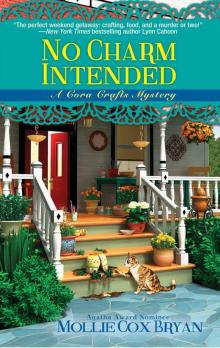 No Charm Intended
No Charm Intended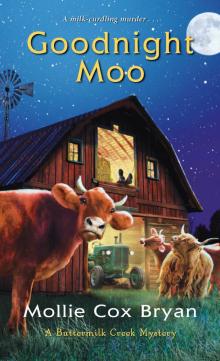 Goodnight Moo
Goodnight Moo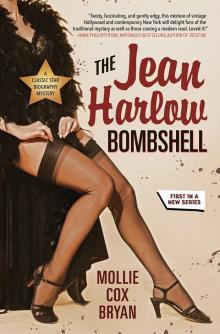 The Jean Harlow Bombshell
The Jean Harlow Bombshell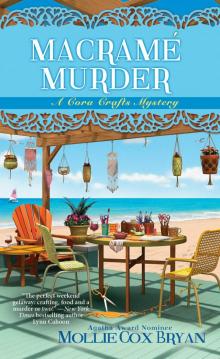 Macramé Murder
Macramé Murder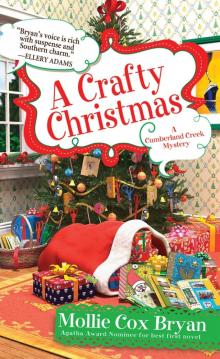 A Crafty Christmas
A Crafty Christmas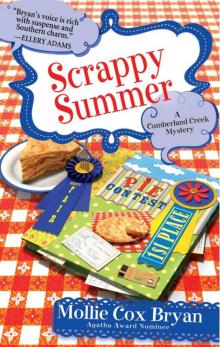 Scrappy Summer
Scrappy Summer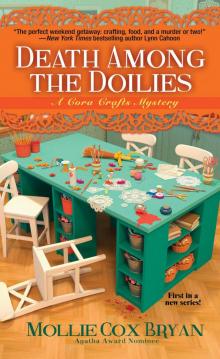 Death Among the Doilies
Death Among the Doilies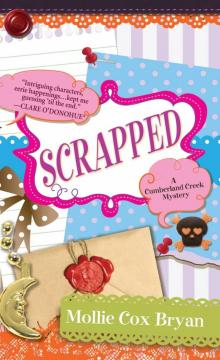 Scrapped
Scrapped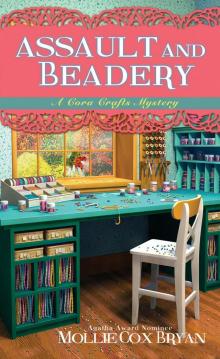 Assault and Beadery
Assault and Beadery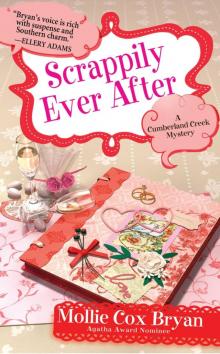 Scrappily Ever After
Scrappily Ever After Scrapbook of Secrets
Scrapbook of Secrets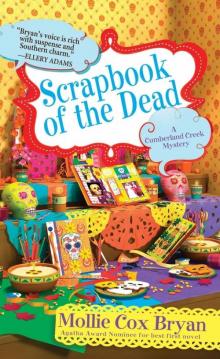 Scrapbook of the Dead
Scrapbook of the Dead